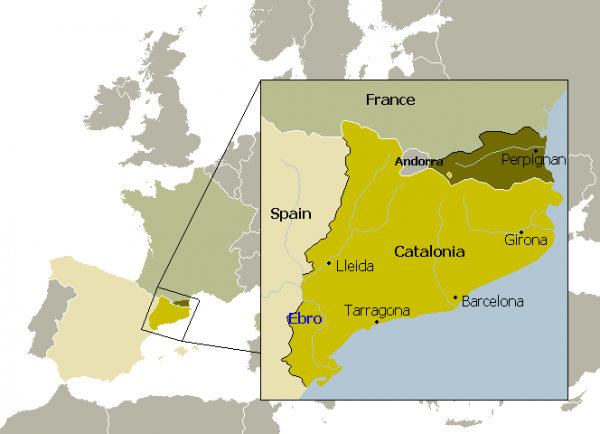Catalonia voted to declare independence from Spain last month, a vote that was declared illegal by the Spanish government. 90 per cent of those who voted were in favor of independence, but only 43 per cent showed up to vote. This was a slightly stronger pro-independence vote than three years ago, when 80 per cent voted yes, out of 40 per cent turnout.
In the wake of the central government’s crackdown, the Catalan president, Carles Puigdemont, fled to Brussels to escape arrest. There is a natural sympathy for Catalan nationalism among the Flemish Belgians, who have their own grievances against the central government of Belgium. The main Flemish nationalist party, the NVA (Nieuw Vlaamse Alliantie, or New Flemish Alliance), is a conservative, nationalist, separatist party. Puigdemont was hosted upon his arrival by Lorin Parys, a Belgian MP and NVA party leader, who tweeted his strong support for the deposed Catalan president.
Russian Interest in Catalonia
Catalan nationalists have been accused also of ties to Russian interests. The EU’s anti-disinformation organization, East Stratcom Task Force, has developed an extensive database of Russian attempts to stir up extremist feelings. The task force identified hundreds of “zombie accounts” that operated in concert to promote false news stories and conspiracy theories about Spanish government actions and external events affecting Catalonia.
After Puigdemont’s flight to Brussels, he was interviewed by former Scottish First Minister Alex Salmond on the inaugural broadcast of his new show on RT, the Russian propaganda channel. Like the NVA, the Scottish National Party (SNP) has a natural affinity for Catalan independence, since the SNP has fought so long and hard for Scottish independence. Puigdemont’s appearance on RT added to the appearance of Russian influence.
George Orwell fought alongside a faction of Trotskyist communists in Catalonia, and his disillusionment led to the writing of Animal Farm
The historical socialist, Marxist influence on the region added to the suspicion in some corners. Catalonia was among the strongest regions to support the (communist) Republicans in the Spanish Civil War against Francisco Franco’s fascist revolution. George Orwell fought alongside a faction of Trotskyist communists in Catalonia, and his disillusionment with Marxists that led to the writing of Animal Farm began with the vicious brutality he saw from the Stalinist communists against the Trotskyists while he was there.
A Long History of Grievances
Some separatist Catalans took to social media to mock the speculation about Russian influence, pointing out that they hardly needed any inflaming. The most quoted is a long thread by a Catalan named Arnau Rwiz, who tweeted, “The new trend among the Spanish nationalism to re-brand its damaged democracy is linking Catalan self-determination movement to Russia and its ‘evil Russian hackers.’ Here [is] a short thread about it.”
There follows a long list of historical Catalan grievances dating from the 17th century, each preceded by the hashtag #RememberWhenRussianHackers, and followed by an event that pre-dates computers, hacking, and in most cases the Russian revolution. One representative sample reads, “#RememberWhenRussianHackers conquered Barcelona in 1713 & 1714 applying Nueva Planta Deecree (abolishing Catalan institutions and banning Catalan language)? Russia’s fault.”
Inflaming passions in order to increase factionalism and division within Western democracies has become one of Russian president Putin’s most effective tools.
Mr. Rwiz’ defense is clever and effective, but the fact remains that Russia did try to inflame passions among the Catalans. Inflaming passions in order to increase factionalism and division within Western democracies has become one of Russian president Putin’s most effective tools. He has done it with spectacular success in Hungary, Poland, France, Germany, Great Britain, Scotland, the United States, and more.

Could Catalonia Survive Independence?
But that does not mean that Catalans do not have legitimate complaints. Among their complaints against the central government is a feeling that they give more to the rest of Spain than Spain gives to them, because taxes and the budget are controlled by Madrid. They have only 16 per cent of the population, but produce 19 per cent of Spain’s GDP, and over a fourth of Spain’s exports. The region paid about $12 billion more in taxes than it received in government spending. Catalonia has a strong industrial sector, one of the busiest ports in Europe (Barcelona) and a highly educated population.
But that does not mean that Catalans do not have legitimate complaints.
These numbers overlook the tremendous debt that Catalonia carries, however – 35 per cent of their regional GDP – most of it owed to the central government. If they were to separate, they would carry not only that debt, but most likely some pro-rated portion of Spain’s substantial international debt. They also would face barriers to EU membership, access to the European Central Bank (they could no longer officially use the Euro as their currency), and perhaps favorable export agreements and travel privileges associated with EU membership.
After sacking the Catalan leaders, the Spanish government has called new regional elections for 21 December. Puigdemont has urged civil disobedience. Other European countries with separatist movements are watching closely, to see whether Catalans will continue their attempt to break with Spain, or step back from the brink. Turnout for the December elections will be an indicator as important as the election results. So far, no European leader has emerged as a possible mediator between the two sides, but perhaps that is still to come.
















